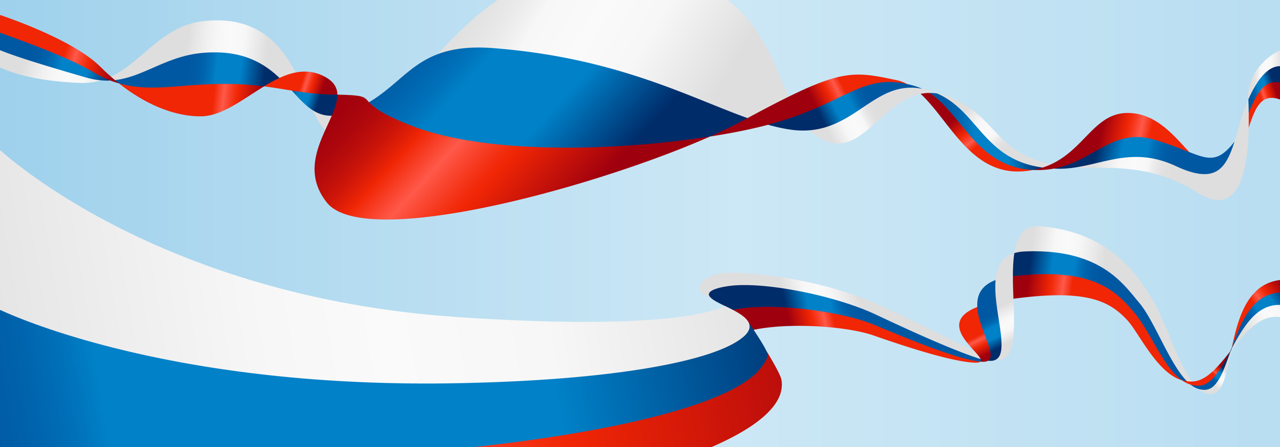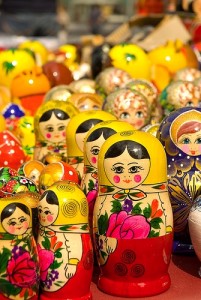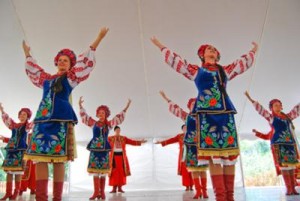Russian Language Basics
The Russian alphabet, derived from the Cyrillic (named for the Greek monk St. Cyril) alphabet, consists of 33 letters, 10 vowel sounds, 21 consonants, and 2 letters that while written have no sound. Some of the Russian letters are borrowed from Hebrew and Greek words, and thus there are similarities in the written letters of the Russian alphabet. As with other languages, one of the syllables (or vowels) is always stressed in the Russian language and changing the stressed accent can change the meaning of the word. Similar to the English language, Russian has “hard” or “soft” sounds for a number of its consonants.
There are also many differences between the printed alphabet and the script alphabet. Much attention is given to the difference between these two forms of writing in Russian. Variations exist for the formal and informal spoken word. Saying hello in a formal way differs from the way one would say hello informally. There are also three genders in the Russian language (masculine, feminine and neuter) that allow for various ways of speaking and writing. In the English language, a plural ending for a word (noun) requires an added “s.” In Russian, there are actually several ways to delineate that a word is plural; the criteria for this is based on gender and whether or not a consonant ends with a hard or soft sound. It is important to use the plural case correctly so that the use of adjectives and pronouns is also correct. The meaning of (and the way it is written) the word “beautiful,” for example, can be spoken and written in four different ways, based upon gender and whether it is singular or plural.
About 81% of Russia’s population speaks the official Russian language. For most, it is their first and only language that they speak. Because of the various ‘minor’ languages that are spoken in Russia, many people speak the native Russian language as well as another minority language, which closely resembles the Russian language anyway. On average, it may take ten percent more words to say in Russian what one would say in the English language. In the English language, one word may be sufficient to convey a thought, while in Russian the same thought would require more words from which to choose. Carefully however, one must consider which word to choose, since even the slightest word change may change the meaning of the sentence entirely.
A main concern for many Russian nationalists is the Western and American influences that are prevalent in Russian society today. Many new words, thought to be “Americanized” or “Western” words have been introduced into every day Russian vernacular, and this has given many in the country cause for concern. Many who are dedicated to maintaining the purest Russian state are concerned that adding in the English and Western words will, in some way, compromise the pure Russian language.
Pronunciation
The basics of Russian pronunciation begin with an understanding of vowels (similar to the English language). The main concept that needs to be understood is that vowels fall into one of two categories: soft-indicating sounds or hard-indicating sounds. One other distinguishing feature of the Russian language is that there are no words in Russian that sound alike, but are spelled differently. For example, in the English language, the homophones “red” and “read” and spelled different, but sound the same. All words in the Russian language have independent sounds and spellings.
When learning the Russian language, it is imperative to gain an understanding of the sounds that the vowels make; likewise, it is important to understand the preceding and succeeding consonant sounds. The Russian language has one sound per letter of the alphabet. In other words, the language does not combine two letters together to form one sound (like the English language, for example, that combines letters like “C” and “H” to make the “ch” sound as in church). Each letter has its own sound. There are 33 letters total, based on the Cyrillic alphabet. There are eleven vowels, and twenty consonants.
As with many languages, syllable stress is an important component of the Russian language. An English word can change meaning, based on the stress of the syllable (for example, the word ‘project’ is pronounced differently based on stress and then takes a different part of speech. Project, with the stress on the first syllable, means a plan to do something or a problem that involves work over time. However, when stressed in the second syllable, project means to send or throw forward). In the Russian language, various vowels (rather than entire words) are pronounced differently based on the stress. For example, the letter “o” can be pronounced differently based merely on where it is in the word and whether or not it is stressed.
In the Russian language, the letter “A” can sound differently, based on whether or not the word is stressed. When the letter “A” is stressed in a word, it sounds like the “a” in father. When it is unstressed, it sounds more like “uh” as in the English word “cut.” Similarly, when the letter “o” is unstressed it a word, it sounds more like the letter “a” but when it is stressed in a word, it sounds more like its name, the letter “o” and the sound of “o” as in the word bore.
The next vowel does not have an English counterpart, and is unique to the Slavic language. It appears to look like the English letter “b” and “l” together. However, when pronounced, they carry the sound similar to “ee” and “oo” as in book. If you place those two English sounds together, you will pronounce of the Russian letter “BL.”
Along the lines of the English “oo” sound, the Russian language has one letter that sounds like the “oo” as in book, and that is the letter “y.” This one letter makes up the sounds of “oo” as in book, and “oo” as in tooth. Another vowel that appears to look like a backwards version of the English letter “E” actually sounds similar to the English “E.” Additionally, the Russian vowel that looks like a backward English letter “R” is pronounced as “ya.”



